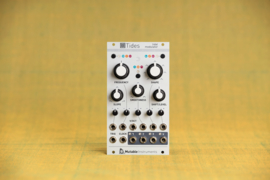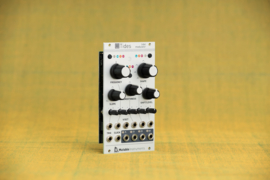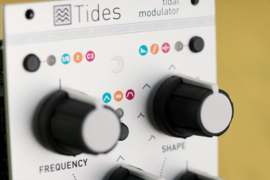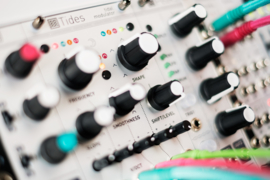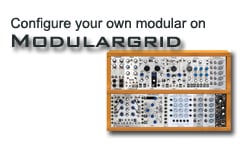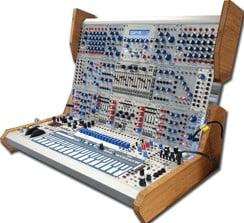Mutable Instruments Tides (2)
Mutable Instruments Tides (2) New (2018) version
Tides got a little refresh. New quad output modes, hardware matching the most recent releases. (Sept 2018)
Tidal modulator
Overview
Tides is all about waves that go up and down, from minute-long cycles to audio rates… This module is Mutable Instruments’ unique take on the looping AD envelope generator – pushing this well-known trope to unknown territories.
The core of the module is a digital asymmetric triangle function generator, which can be used in AD and AR modes (for envelope generation), or looping (as a VC-LFO or VC-DO). The triangle generator is followed by a wavetable waveshaper providing linear, exponential, logarithmic, sinusoidal, or arc-sinusoidal shapes for the A and D segments. Then, a second processor applies either a 2-pole low-pass filter to the waveform, smoothing its sharp edges; or a rubbery wavefolder, adding kinks and “bounces” to the waveform. Because Tides has been designed from the ground up to work at audio rates with minimal aliasing, and because all its parameters are under voltage control, it can be used as a unique self-contained synth voice.
Tides’ advanced features include:
- Output level CV input (digital VCA).
- Dual outputs: standard unipolar waveform, and “double-shot” waveform with a positive spike during the ascent and a negative spike during the descent. At audio rate, both of them have a different sound.
- Accurate V/Oct tracking with straightforward calibration procedure.
- Freeze input to temporarily hold the waveform.
- Clock input to lock onto a multiple or fraction of a trigger sequence… or audio signal, PLL-style.
Digital ramp up/ramp down signal generator with wide frequency range and one-shot modes – usable as a LFO, a VCDO or an AR/AD generator.
Features, controls, I/O
- Cycle mode selector: single shot AD, single shot AR, looping (VC-LFO/VCDO).
- Frequency range selector: low (20 minutes to 5 Hz), medium (0.05 Hz to 300 Hz), high (8 Hz to 10kHz).
- Frequency control, with 1V/Oct frequency CV input.
- Exponential FM CV input, with attenuverter.
- Shape control with CV input – covering various combinations of linear, exponential, or raised cosine segments.
- Slope/asymmetry (A/D time ratio) control with CV input.
- Smoothness control with CV input. From 0V to -5V, smoothes the waveform using a 2-pole digital filter, from 0V to +5V, adds bumps and kinks with a digital wavefolder.
- Unipolar CV input controlling output level.
- Trigger input, which works as a trigger in AD/AR modes and a sync/reset in looping mode.
- Clock input to “tap” or “ping” the LFO and envelopes, or to lock the VCDO frequency through a PLL. In these cases, the frequency control acts as a frequency division/multiplication control.
- Freeze gate input to stop the oscillator and hold its output.
- High tide and Low tide gate outputs for chaining/quadrature operation, or other applications such as gate delaying.
- Unipolar (8V) and bipolar (+/- 5V) outputs, with a distinct shape/character.
Technical characteristics
- All inputs: 100k impedance, DC to 500 Hz for shape/slope/smoothness, DC to 3kHz for FM, DC to 24 kHz for level.
- 12-bit CV acquisition with separate power supply for converters and references.
- 16-bit CV generation, 48kHz sample rate (12.5kHz in the lowest frequency range).
- Cortex-M3 ARM processor.
- Open-source hardware and firmware.
- 14-HP.
- Easy firmware updates through an audio interface.
- Current consumption: +12V:50mA -12V:20mA

